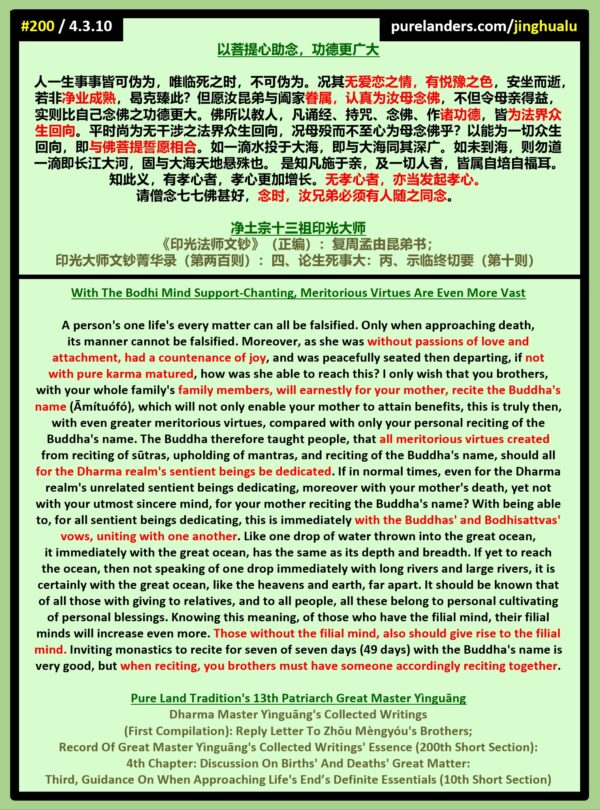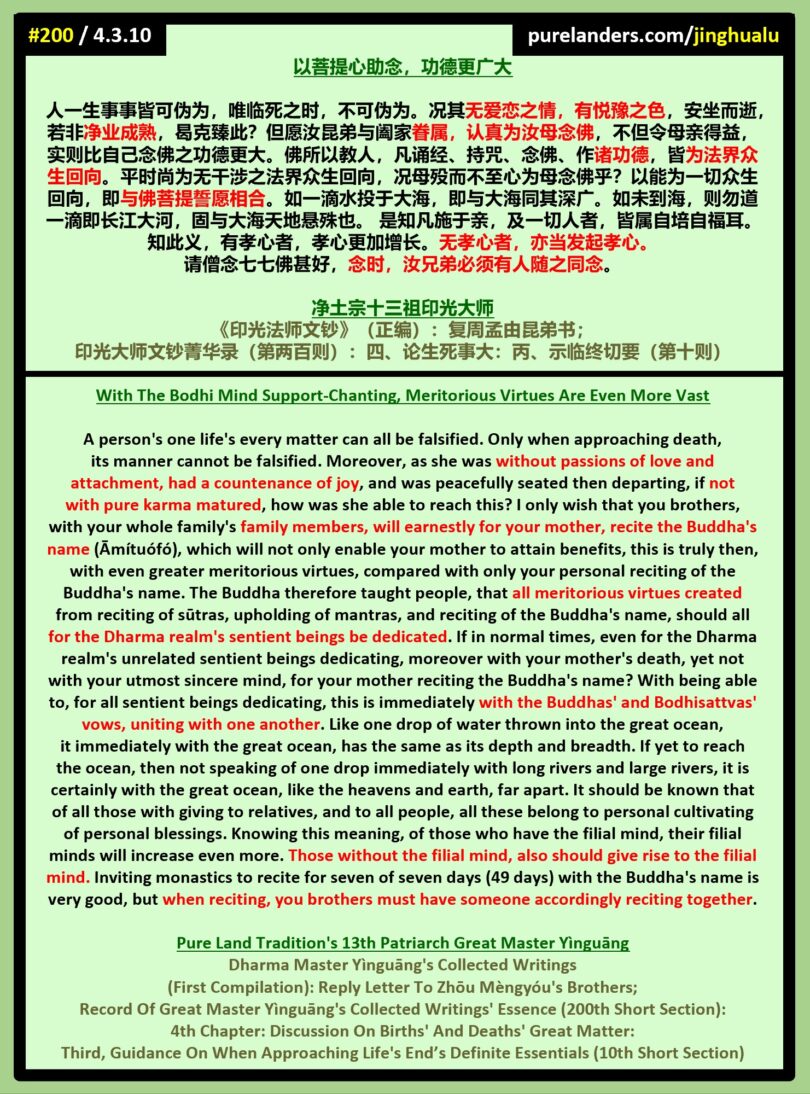以菩提心助念,功德更广大
[200] With [The] Bodhi Mind Support-Chanting, Meritorious Virtues [Are] Even [More] Vast
人一生事事皆可伪为,唯临死之时,不可伪为。况其无爱恋之情,有悦豫之色,安坐而逝,若非净业成熟,曷克臻此?
[A] person’s one life’s every matter can all [be] falsified. Only when approaching death, [its manner] cannot [be] falsified. Moreover, [as] she [was] without passions of love [and] attachment, had [a] countenance of joy, [and was] peacefully seated then departing, if not [with] pure karma matured, how [was she] able [to] reach this?
[Note 1: The manner of departing from this life clearly reflects the state of mind then, be it peaceful or disturbed, for better or worse. This letter’s recipients’ mother’s ability to depart with a peaceful and joyful expression (面相安乐), what more when seated upright (端坐) calmly, are clear auspicious signs (瑞相) of having karma for birth in Pure Land most likely being adequate.]
但愿汝昆弟与阖家眷属,认真为汝母念佛,不但令母亲得益,实则比自己念佛之功德更大。
[I] only wish [that] you brothers, with [your] whole family’s family members, [will] earnestly for your mother, recite [Amitā(bha)] Buddha[‘s name (Āmítuófó: 阿弥陀佛), which will] not only enable [your] mother [to] attain benefits, [this is] truly then, [with] even greater meritorious virtues, compared [with only] your [personal] reciting [of the] Buddha[‘s name].
[Note 2: Since one person’s or a few persons’ sincere mindfulness of the Buddha can create much meritorious virtues, many persons’ similar practice will create even much more meritorious virtues.]
佛所以教人,凡诵经、持咒、念佛、作诸功德,皆为法界众生回向。
[The] Buddha therefore taught people, [that] all meritorious virtues created [from] reciting [of] sūtras, upholding [of] mantras, [and] reciting [of the] Buddha[‘s name, should] all for [the] Dharma realm’s sentient beings [be] dedicated.
[Note 3: When all practices, including support-chanting (助念), are practised for creating and dedicating meritorious virtues to benefit all beings, not just for one or a few persons, they become Bodhisattva practices (菩萨行) arising from the Bodhi Mind (Bodhicitta: 菩提心). Practising with this motivation creates even more meritorious virtues (功德).]
平时尚为无干涉之法界众生回向,况母殁而不至心为母念佛乎?以能为一切众生回向,即与佛菩提誓愿相合。
[If] in normal times, even for [the] Dharma realm’s unrelated sentient beings dedicating, moreover [with your] mother’s death, yet not [with your utmost] sincere mind, for [your] mother reciting [the] Buddha[‘s name]? With [being] able [to], for all sentient beings dedicating, [this is] immediately with [the] Buddhas’ [and] Bodhisattvas’ vows, uniting [with] one another.
[Note 4: If in everyday practice, we are already encouraged to dedicate meritorious virtues from daily practices to benefit all beings, when a family member departs, all the more should we practise mindfulness of Buddha sincerely, also for all beings. To do so is to express the Bodhi Mind similar to that of the Buddhas and Bodhisattvas.]
如一滴水投于大海,即与大海同其深广。如未到海,则勿道一滴即长江大河,固与大海天地悬殊也。
Like one drop [of] water thrown into [the] great ocean, [it] immediately with [the] great ocean, [has the] same [as] its depth [and] breadth. If yet [to] reach [the] ocean, then not speaking [of] one drop immediately [with] long rivers [and] large rivers, [it is] certainly with [the] great ocean, [like the] heavens [and] earth, far apart.
[Note 5: Even if practising as a single person, but with the Bodhi Mind, one’s otherwise limited meritorious virtues created will merge with that of others’ meritorious virtues, which were also created with the same Bodhi Mind. Synergising in this way, everyone’s meritorious virtues will become great collectively.]
是知凡施于亲,及一切人者,皆属自培自福耳。知此义,有孝心者,孝心更加增长。无孝心者,亦当发起孝心。
[It should] be known [that of] all those [with] giving to relatives, and [to] all people, all [these] belong [to] personal cultivating [of] personal blessings. Knowing this meaning, [of] those [who] have [the] filial mind, [their] filial minds [will] increase even more. Those without [the] filial mind, also should give rise [to the] filial mind.
[Note 6: Although one practises to create and give (i.e. dedicate) meritorious virtues to others, the one who benefits most directly is oneself. This is a reason why practising with the Bodhi Mind is powerful, for benefitting one and all. Remembering that all beings have been reborn as our mothers and fathers in our past lives can motivate us to have even more filial piety.]
请僧念七七佛甚好,念时,汝兄弟必须有人随之同念。
Inviting monastics [to] recite [for] seven [of] seven [days (i.e. 49 days) with the] Buddha[‘s name is] very good, [but] when reciting, you brothers must have someone accordingly reciting together.
[Note 7: In case the deceased’s consciousness is still around, this is to express sincerity in offering guidance and meritorious virtues, instead of merely ‘outsourcing’ filial piety. This is in hope that the deceased will follow one’s example, to also sincerely recite, so as to reach Pure Land. However, for this case, due to the mother’s clear auspicious signs above, she is most likely to have reached it already. Yet, this practice is still encouraged, just in case this is not so. The ‘extra’ meritorious virtues created and dedicated can help the deceased attain a higher grade of birth, and also benefit other beings.]
净土宗十三祖印光大师
Pure Land Tradition’s 13th Patriarch Great Master Yìnguāng
《印光法师文钞》(正编):复周孟由昆弟书;
Dharma Master Yìnguāng’s Collected Writings (First Compilation): Reply Letter [To] Zhōu Mèngyóu’s Brothers;
印光大师文钞菁华录(第两百则):四、论生死事大:丙、示临终切要(第十则)
Record [Of] Great Master Yìnguāng’s Collected Writings’ Essence (200th Short Section): 4th [Chapter]: Discussion [On] Births’ [And] Deaths’ Great Matter: Third, Guidance [On When] Approaching [Life’s] End’s Definite Essentials (10th Short Section)
[Ref: #200 / 4.3.10]
Namo Amituofo : Translation and notes by Shen Shi’an
下一部分
Next Part:
念佛利益多于诵经拜忏做水陆
[201] Mindfulness Of Buddha’s Benefits Surpass Those From Reciting Sūtras, Prostrating With Repentance, And The Water And Land Dharma Assembly
https://purelanders.com/2022/08/12/201-mindfulness-of-buddhas-benefits-surpass-those-from-reciting-sutras-prostrating-with-repentance-and-other-dharma-assemblies
上一部分
Previous Part:
病苦者之安慰
[199] Consolation For Those Suffering From Sickness
https://purelanders.com/2022/07/18/how-to-see-suffering-when-very-sick
完整典籍
Complete Text:
《印光大师文钞菁华录》
Record Of Great Master Yìnguāng’s Collected Writings’ Essence
https://purelanders.com/jinghualu




